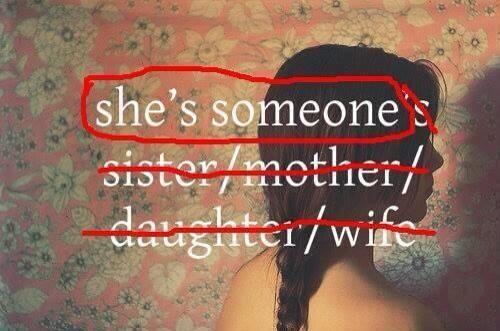
This weekend, there were two hashtags that caught my eye on Twitter: #sexismturnedaround and #YesAllWomen. The former started as a discussion about women pastors, but soon got much wider, and the latter began as a response to the awful Santa Barbara shootings.
Both were important discussions- I'd strongly recommend checking them out on Twitter, and I'm sure there'll be more of both in coming days. It's powerful to see a community come together around a shared topic or interest, especially ones as close to my heart as these - but they also reminded me of something I've been realising over the past few months.
Since I began writing and talking more about feminism and discrimination, women – both friends, and new acquaintances – have been sharing their stories on similar topics with me. And it's made me realise that, sadly, I'm lucky to be able to be writing about my experiences, and talking about them openly; with all of the experiences I've written about thus far, I've been able to get out of situations where I've been faced with bigotry or discrimination within a few hours, or at most a couple of days. I've always felt like I'm in a safe space (both online and offline) by the time I'm writing about these experiences. This is not the case for so many women out there.
Women who I've spoken to are faced with sexism as part of their everyday professional lives; some are living with the threat (or reality) of domestic violence or abusive partners, but who are too scared to leave; and almost all of them know that if they call out or even mention the abuse they are facing, it will almost certainly lead to even more difficulties for themselves, without any such certainty that their abusers will face any kind of consequences. With odds like that, it's not hard to understand why they choose to stay quiet.
It's been truly eye-opening for me to realise how many people around me are faced with those kinds of situations, and I have no doubt it would shock most other people out there too. Men around me have commented on how they're surprised that I face discrimination so often, and while I take that primarily as a compliment that they're really paying attention to what I'm saying or writing, and I appreciate hugely the discussions that have come out as a result, I'd also like to explicitly point out that my experiences are a minuscule drop in the pond compared to what women around all of us are facing every day. This might sound obvious, but I think it's worth saying: the fact they're not talking about it doesn't mean it's not happening.
I truly love the fact that writing has opened up these conversations with women and men around me, and I've learned an incredible amount from them (and, I hope I will continue to for a long time!). Writing, for me at least, is also a very cathartic act – it gives me a space to get things off my chest, to share experiences, and to think through ideas. Sometimes, it's been a way for me to say what I wanted to say at the time, but I couldn't – through fear, or shock, or a mixture of both. Knowing that other women out there don't even have this kind of outlet, is painful to me.
So back to Twitter; it's inevitable, then, that the women writing on these hashtags and sharing their views are just a tiny, tiny proportion of the people who are faced with discrimination and sexism. Obviously, it's only those of us who feel safe enough to write without the threat of repercussions who are participating.
I'd suggest that the large majority of women who are faced with abuse on a regular basis feel compelled to stay quiet because of the unsafe space they are in. However depressing or shocking the online discussions might get- bear in mind that they're just a tiny glimpse into the wider societal problems being addressed.